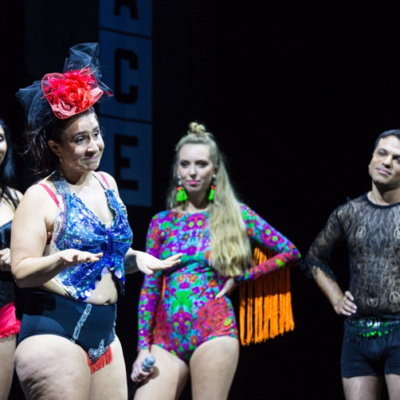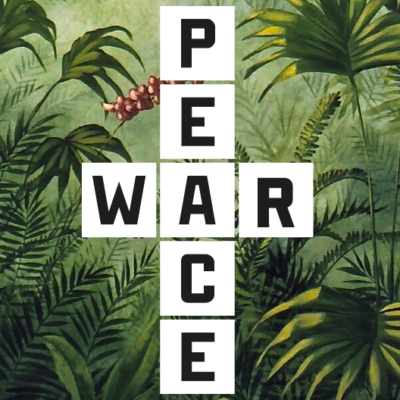“Everyone here is a potential game-changer” welcomed the journalist Laila Harrak from the Deutsche Welleall the participants of the “War or Peace?” festival back in the Maxim Gorki Theatre for the closing ceremony. After three days of fruitful discussions and shared experiences, everyone involved in the festival can proudly look back to four colourful days, which must be called a great success in every aspect. More than 400 “game-changers” from over 50 countries had participated in the event and together, they have created some astonishing results in 20 different workshops all around the 100-year anniversary of the end of the first world war.
During the closing ceremony, we had the chance to reflect on four truly extraordinary days in Berlin which had produced many remarkable results. Following a short movie, which had reviewed some great snapshots of the festival, the German State Secretary of the Federal Ministry of the Interior, Building and Community, Dr Markus Kerber, offered a brief introductory statement. “History is the biggest book of lessons about human experience” began Kerber his statement and emphasised that “we should have commemorated the end of the first world war more”, especially because the subject happened to be somewhat neglected in Europe. He was therefore even more impressed by the festival and the exhibition of the causes and consequences of the war: “We always have the choice to prevent war!”.
In the first major segment of the ceremony, Laila Harrak guided the audience through a panel discussion about the choices we have at crossroads of history. Next to Dr Kerber participated Prof Jörn Leonard from the University of Freiburg and several representatives of the “War or Peace?” workshops in the panel discussion. One of them was Michael Hasheela from Namibia who had participated in the “Unity vs. Diversity” workshop. He shed light on the contemporary challenge of material wealth and well-being with respect to global migration and argued for a paradigm shift towards more co-operation rather than hostility.
In order to change roads towards more co-operation, Prof Leonard, who is a fellow of the Royal History Society in London, put an emphasis on the practical benefit of history. Despite that history doesn’t offer an easy blueprint for what we must do, he stressed that war isn’t an anthropological continuity of humankind, but in fact, there are real peace processes. His hope was echoed by the participants of the workshops. “We must look for alternative ways which do not include violence” which would have to involve young people crafting what the world looks like, said a young activist Bongiwe Ndlovu from South Africa. And social media, when used constructively, can play an important role in this process, adds the Ukrainian student and activist Kateryna Demerza.
The cultural highlight of the closing ceremony presented the musical contribution of the Serbian singer Vernesa Berbo. Her emotional and soulful performance of Balkan music, and especially Roma and Sinti songs, took the audience on a great musical journey. Moreover, she is going to play her hauntingly beautiful music on the 15thDecember with her entire band, the Balkan boys, in the Maxim Gorki Theatre.
 In the final part of the ceremony, a selection of the many workshops shared their results of the past days. One particular inspiring communality of all the workshops was the respectful and amical atmosphere among all the participants. It was amazing to learn how propaganda posters aim to win over the public in the “Propaganda vs. Civic Education” workshop or how podcasting can deal with phycological traumas of solders in the “Trauma vs. Everyday” workshop. The final point of the ceremony marked the presentation of the “History vs. Future” workshop, which dealt with the war’s impact on Africa specifically. The participants concluded that the hidden narratives of Africa illustrate the danger of singly story. Only by unpacking the many individual and emotional stories of the past, we can understand the complete story. There is no more to say than thanking Nina Schillings from the bpb and Shermin Langhoff from the Gorki Theatre for a truly extraordinary festival!
In the final part of the ceremony, a selection of the many workshops shared their results of the past days. One particular inspiring communality of all the workshops was the respectful and amical atmosphere among all the participants. It was amazing to learn how propaganda posters aim to win over the public in the “Propaganda vs. Civic Education” workshop or how podcasting can deal with phycological traumas of solders in the “Trauma vs. Everyday” workshop. The final point of the ceremony marked the presentation of the “History vs. Future” workshop, which dealt with the war’s impact on Africa specifically. The participants concluded that the hidden narratives of Africa illustrate the danger of singly story. Only by unpacking the many individual and emotional stories of the past, we can understand the complete story. There is no more to say than thanking Nina Schillings from the bpb and Shermin Langhoff from the Gorki Theatre for a truly extraordinary festival!
From Dominik Rehbaum





